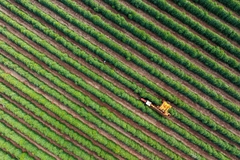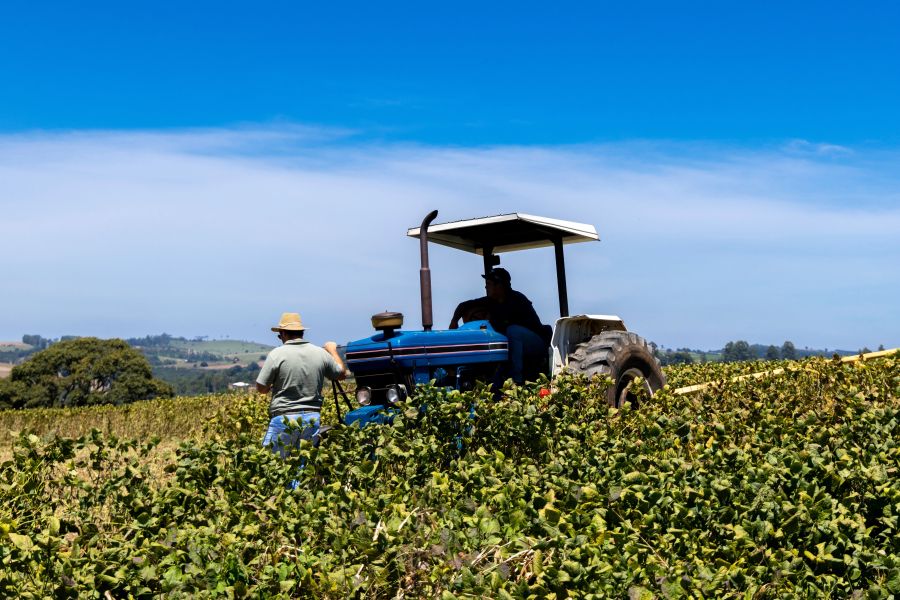
- Industry news
Industry news
- Category news
Category news
- Reports
- Key trends
- Multimedia
- Journal
- Events
- Suppliers
- Home
- Industry news
Industry news
- Category news
Category news
- Reports
- Key trends
- Multimedia
- Events
- Suppliers
COP30: Brazil launches farmland restoration accelerator to bridge US$105B annual funding gap
Key takeaways
- Eight countries back the Brazil-led RAIZ accelerator to close the US$105 billion annual funding gap for restoring degraded farmland through public-private financing mechanisms.
- Brazil’s EcoInvest program mobilized US$6 billion, but launched in mid-2025, too early to demonstrate agricultural productivity gains or food security improvements.
- Demand-driven approach will help governments map degraded areas, design co-investment vehicles, and derisk private capital in response to country requests.

Eight countries have backed a Brazil-led financing accelerator to close a US$105 billion annual funding gap for restoring degraded farmland worldwide, though the Brazilian programs it draws on are too new to demonstrate productivity gains yet.
The Resilient Agriculture Investment for net-zero land degradation (RAIZ) accelerator will help governments unlock public and private investment through tailored financing mechanisms that derisk private capital. Reversing just 10% of cropland degradation could restore 44 million metric tons of annual food production.
The accelerator builds on Brazil’s Green Way and EcoInvest programs, which mobilized close to US$6 billion in public debt and commercial loans to restore up to three million hectares of pastureland. However, EcoInvest launched only in mid-2025, making it too early to quantify agricultural productivity gains or food security improvements.
“The first EcoInvest Auction was only launched in mid-2025, so it’s still too early to say what the productivity gains will be,” Alessia Mortara, head of international policy engagement at the Food and Land Use Coalition, tells Food Ingredients First. “However, monitoring systems are being put in place to track progress indicators.”
The US$105 billion figure represents the annual cost of restoring degraded farmland globally by 2030, not a one-time investment. The private sector could contribute up to US$90 billion annually to on-farm nature-based solutions — including but not limited to restoration of degraded land.
“RAIZ aims to help countries develop specific financing mechanisms that respond to their unique contexts and financing needs,” Mortara says. The accelerator will draw on lessons from Brazil’s EcoInvest, Rwanda’s Ireme Invest, and Colombia’s Finagro to unlock public and private finance.
These schemes share common characteristics. They often leverage public and concessional capital to derisk private investment through instruments including credit lines with interest-rate subsidies, longer tenors or grace periods, and project-level guarantees or first-loss tranches to balance the risk-return profile.
“Additional instruments, such as insurances or long-term offtake agreements, could further reduce the cost of capital and share the risk,” Mortara says. “Collaboration between public and private investors is essential to unlock restoration finance at scale.”
Mapping degraded land
The accelerator will provide technical assistance to help governments map degraded landscapes, identify investable restoration solutions, design co-investment mechanisms, and foster knowledge exchange. Through RAIZ, the UNCCD G20 Global Land Initiative team and technical partners, including the UN FAO, have built a global land map to identify degraded farmland worldwide.
Brazil’s RAIZ accelerator aims to unlock public and private investment for restoring degraded farmland.Next year they will prioritize areas for restoration that present the greatest opportunity for food security and climate resilience.
“That being said, RAIZ will be a demand-driven accelerator and respond to country requests for support,” says Martial Bernoux from FAO’s FAST partnership. Over the coming months, the team will engage closely with priority countries that have both high rates of degradation and strong opportunities for restoration to gauge their interest. Any countries interested in receiving support can fill out a form on the RAIZ website.
The accelerator is supported by Australia, Canada, Japan, Saudi Arabia, New Zealand, Norway, Peru, the UK, and Germany. It will be hosted by Brazil’s Ministry of Agriculture and Livestock under the FAO FAST Partnership, with collaboration from the UNCCD G20 Global Land Initiative and the Food and Land Use Coalition, in partnership with the Action Agenda for Regenerative Landscapes.
Smallholder safeguards
The financing stack needed to restore degraded farmland will depend heavily on the geographies, commodities, and farmer groups requiring funding. Where communities are predominantly composed of smallholder farmers, RAIZ will aim to propose mechanisms that can unlock funding for these communities to secure livelihoods and ensure resilience.
“Policy recommendations may also include legislative frameworks that can protect land rights and ensure inclusive governance to help communities attract and manage financing and investment — making sure restoration finance strengthens, rather than undermines, rural livelihoods,” Mortara says.
The Action Agenda for Regenerative Landscapes has seen more than 40 organizations commit to investing over US$9 billion in rural landscapes by 2030, covering more than 210 million hectares and reaching 12 million farmers across 90-plus commodities and 110-plus countries. Of this figure, US$2.5 billion has already been deployed with US$6.6 billion planned by 2030. The accelerator will help governments design financing mechanisms that derisk private capital through instruments including credit subsidies, guarantees, and first-loss tranches.
The accelerator will help governments design financing mechanisms that derisk private capital through instruments including credit subsidies, guarantees, and first-loss tranches.
“The Action Agenda on Regenerative Landscapes has identified five lessons for success for investments in land restoration and resilient agrifood systems, which will inform RAIZ's approach,” says Victoria Crawford, director of agriculture and food at WBCSD.
“Despite millions pledged for regenerative agriculture in recent years, much of the financing remains fragmented — locked in small-scale, blended facilities tied to specific projects, commodities or geographies,” says Morgan Gillespy, executive director at the Food and Land Use Coalition.
“Through RAIZ, FOLU and its partners are bringing investors and farmers to the table with governments to co-design joint investment mechanisms at the national level that align public incentives with private capital.”
Delivery timeline
RAIZ has developed a Plan to Accelerate Solutions outlining the delivery pathway from 2026 to 2030. Action will be taken at both global and national levels to unlock financial flows for farmland restoration by mapping farmland restoration, identifying and costing investable solutions, co-designing optimal financing mechanisms, and sharing knowledge.
At the global level, the initiative is engaging closely with the UNFCCC, UNCCD, and UNCBD to take RAIZ forward to future COPs across the Rio Conventions.
National delivery will depend on the country’s appetite, but the objective is to support six countries representing around 30% of degraded farmland by 2030. The accelerator was officially launched at a ministerial event at UNFCCC COP30 in Belém today (November 19).
The launch supports the COP30 Presidency’s action agenda on transforming agriculture and food systems, with a focus on land restoration. Farmland restoration is also central to the Rio Conventions and the UN 2030 Agenda, notably SDG 15.3, which aims to achieve Land Degradation Neutrality by 2030.











